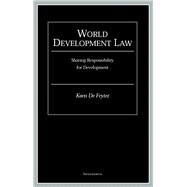World Development Law Sharing Responsibility for Development
, by Feyter, Koen De- ISBN: 9789050951531 | 9050951538
- Cover: Paperback
- Copyright: 1/8/2001
The 1986 United Nations Declaration on the right to development declares that the human person is the central subject of development. World Development Law takes this statement as a starting point. To what extent has the branch of international law that deals with North-South relationships changed since 1986? What has been the effect of moving the individual to the centre of the stage in development relationships? Clearly, the relationship between development co-operation and human rights has been reinforced. More generally however, there is growing recognition of the need to involve a multiplicity of actors in the development process. The emphasis on the individual has implied increased roles for actors at the subnational level, such as indigenous, nongovernmental and community organisations. At the same time, doubts about the capacity of the State to master the development process have grown as well. What can be expected from heavily indebted States, or from States that rely on private companies that exploit their natural resources? Fascinating developments are occurring indevising the responsibility for development of international trade and financial intergovernmental organisations and of transnational corporations. World Development Law introduces current trends in defining the development roles of each of the relevant actors in concise 30-pages chapters. The final chapter formulates a number of proposals on what a future humane order could look like. In essence the approach is a legal one, but the book should also appeal to those engaged and interested in development and human rights from the perspective of other disciplines.







